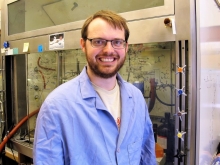Andrew Zahrt Receives Scialog Funding for Automating Chemical Laboratories

Andrew Zahrt, an assistant professor of chemistry, is a member of one of seven teams of early career researchers that have won Scialog funding for automating chemical laboratories. Zahrt’s team’s project is called Automated Workflows to Assess Physical Constraints in Neural Networks for Molecular Property Prediction.
As large amounts of data have become routinely accessible to organic chemists, scientists have developed data-driven workflows that automate or optimize tasks based on data analysis. Zahrt’s research focuses on bridging the gap between the amount of data available and the limited types of data-driven workflows that exist. He is working on strategies designed to complement existing workflows, to be flexible, and to be accessible to labs with different levels of equipment and expertise. Using the technology, he and his lab seek to expedite reaction optimization, catalyst design, reaction analysis, and reaction discovery, developing useful synthetic reactions along the way.
The awards are given through Scialog: Automating Chemical Laboratories, a three-year initiative that aims to accelerate innovation and broaden access within the chemical enterprise through advances in automated instrumentation and artificial intelligence. Individual awards of $60,000 will go to 17 researchers from several institutions in the United States and Canada.
Scialog, short for “science + dialog,” was created in 2010 by the Research Corporation for Science Advancement. The Scialog format aims to accelerate breakthroughs by building a creative network of scientists that crosses disciplinary silos and by stimulating intensive conversation around a scientific theme of global importance. Participants are selected from multiple disciplines, approaches, and methodologies and propose high-risk, high-reward projects based on innovative ideas.





